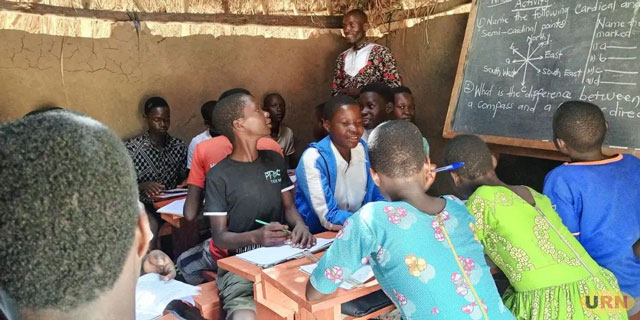
Children aged between 9 to 14 years are now learning under the Speed School Program, an initiative of Geneva Global Uganda
Kalaki, Uganda | THE INDEPENDENT & URN | Across Uganda, approximately 40% of primary aged children drop out of school system, according to local education officials. These numbers are especially high in the nine rural districts where Geneva Global Uganda launched the Speed School Program in February 2023.
An innovative accelerated education program, Speed School brings primary-aged out-of-school children into formal education to learn the first three years primary education in ten months. The program also organizes the learners mothers into Self-Help Groups to receive financial literacy training and operate income-generating activities and group savings that permit them to support their children’s future education.
In partnership with a group of local NGOs, the program first launched in four districts of the Acholi Sub-Region 2016 and expanded to five other northern districts and two municipalities in 2020. To date, the program has supported more than 60,000 out-of-school children in Uganda to re-join the formal education system or enter a classroom for the first time. On average, 90% of Speed School learners in Northern Uganda continue the next year in a government primary school. There they routinely excel.
This year, Geneva Global has joined with four additional districts to introduce Speed School in Uganda’s Eastern Region. These are Kalaki, Amuria, Mayuge and Namutumba districts. The program will reach a total 6,300 children and will, for the first time, including children who are able to complete the P4 and P5 curricula.
On March 15th we joined Geneva Global’s team in Kalaki district for the program’s official launch. Kalaki will host 28 Speed School classes to reach over 800 out-of-school children.
As in the other eight districts, Speed School will operate in only two of Kalaki’s sub-counties. However, Geneva Global Uganda’s country director, Rebecca Ecwou, encouraged district officials that, with a successful first Speed School year, the prospects of attracting more funding to add new sub-counties next year should be high.
“Time and again there is a small complaint of ‘why only two sub counties?,’” Ecwou explained. “We are doing so because of the many lessons we have learnt over our seven years of operation. Initially, we would operate throughout a district, but we confronted many challenges supervising over such wide territories. So we decided to start with just two sub-counties in a district to allow us and the local authorities to learn how best to manage the new model. This doesn’t mean that will not reach the other sub counties; as long as Geneva Global has funding and as long as the children are there, we will join with the local authorities to comb as much of the district as possible.”
Ecwou encouraged the school administrators and facilitators to ensure that the children who have enrolled are truly eligible, explaining that in past years some parents have attempted to take advantage of the program to enroll children who may be as young as five years old and even to withdraw some older children from conventional classrooms to join Speed School.
Vicky Adoch, Kalaki district’s Senior Inspector of Schools, expressed enthusiasm for the program and the progress Geneva Global Uganda has already made toward reducing the number of school dropouts and non-entrants in the district.
“We realize the children get taken up with fishing … they end up ignoring education. The Speed School project will help us to solve the problem because I know they will not get back to the villages again; they will remain at school because, if you look at the way they teach, the learning is interesting, not as usual, as we know in our ordinary setting. Also, the support they give to the parents and to the child can allow this child to remain at school.”
She added that “The traumatized parents cannot provide psychosocial support to their children, they end up dropping out of school as a result of lack of guidance from their own parents, however much the district struggles to have all children at school.”
Indeed, the parents whose children are beneficiaries of this program are excited that the children have a second chance to attain formal education. In support, some have even taken it upon themselves to construct independent classrooms to accommodate these learners. The parents are now encouraging Geneva Global to operate Speed School classes in all the schools across the district. Admiring the aspiration, Ms. Ecwou reminded these parents that this will require more funding than Geneva Global has.
Ellen Carney, a representative from Geneva Global Headquarters in the United States encouraged the district officials and parents further saying, “We are so inspired by the commitment we have seen here today. This is a team effort, and we will not achieve our goals without your partnership. I hope the level of enthusiasm we are seeing here today will be maintained throughout the year and beyond, so that we can reach as may out-of-school children as possible and prevent further dropouts.”
Christopher Okumu, Kalaki District’s Chief Administrative Officer urged district stakeholders to work toward controlling school dropouts, reminding them that the district has the capacity to “fight the vice without relying on development partners.”
“Why should we have dropouts when government is providing free education? I think we should be looking beyond this and find out the solution. If Geneva Global had not come in, were we just going to leave these children to rot? These are some questions that we must answer as leaders of this district and coming up with some interventions. I know the program is good, but we can make it better and see how best we can address this challenge.”
Under the Speed School project, Geneva Global will also help the parents under their Self-Help Groups with startup capital so that they save and support their children in the next level of education.
 The Independent Uganda: You get the Truth we Pay the Price
The Independent Uganda: You get the Truth we Pay the Price


